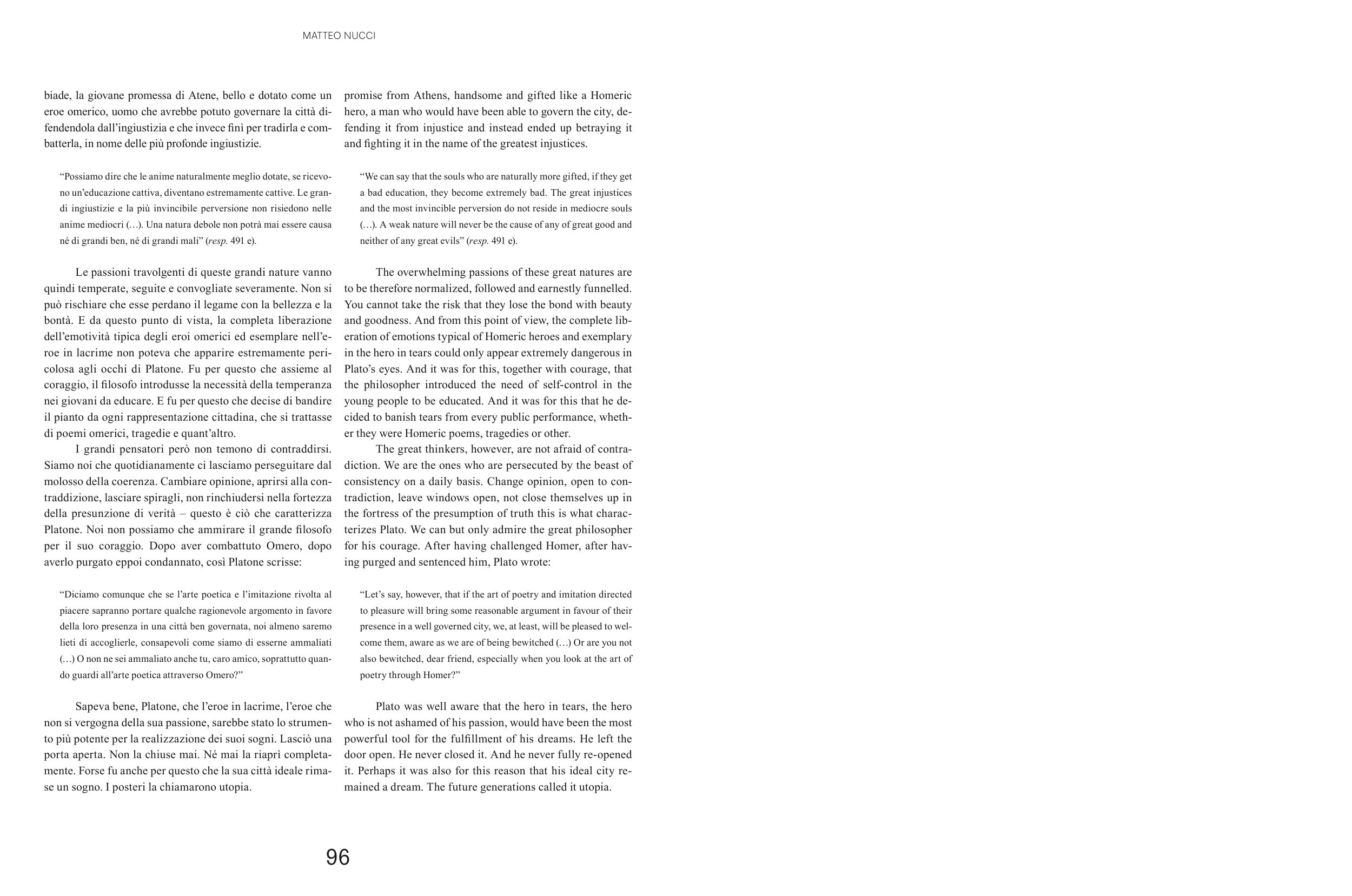96
biade, la giovane promessa di Atene, bello e dotato come un
eroe omerico, uomo che avrebbe potuto governare la città di-
fendendola dall’ingiustizia e che invece fi nì per tradirla e com-
batterla, in nome delle più profonde ingiustizie.
“Possiamo dire che le anime naturalmente meglio dotate, se ricevo-
no un’educazione cattiva, diventano estremamente cattive. Le gran-
di ingiustizie e la più invincibile perversione non risiedono nelle
anime mediocri (…). Una natura debole non potrà mai essere causa
né di grandi ben, né di grandi mali” (resp. 491 e).
Le passioni travolgenti di queste grandi nature vanno
quindi temperate, seguite e convogliate severamente. Non si
può rischiare che esse perdano il legame con la bellezza e la
bontà. E da questo punto di vista, la completa liberazione
dell’emotività tipica degli eroi omerici ed esemplare nell’e-
roe in lacrime non poteva che apparire estremamente peri-
colosa agli occhi di Platone. Fu per questo che assieme al
coraggio, il fi losofo introdusse la necessità della temperanza
nei giovani da educare. E fu per questo che decise di bandire
il pianto da ogni rappresentazione cittadina, che si trattasse
di poemi omerici, tragedie e quant’altro.
I grandi pensatori però non temono di contraddirsi.
Siamo noi che quotidianamente ci lasciamo perseguitare dal
molosso della coerenza. Cambiare opinione, aprirsi alla con-
traddizione, lasciare spiragli, non rinchiudersi nella fortezza
della presunzione di verità – questo è ciò che caratterizza
Platone. Noi non possiamo che ammirare il grande fi losofo
per il suo coraggio. Dopo aver combattuto Omero, dopo
averlo purgato eppoi condannato, così Platone scrisse:
“Diciamo comunque che se l’arte poetica e l’imitazione rivolta al
piacere sapranno portare qualche ragionevole argomento in favore
della loro presenza in una città ben governata, noi almeno saremo
lieti di accoglierle, consapevoli come siamo di esserne ammaliati
(…) O non ne sei ammaliato anche tu, caro amico, soprattutto quan-
do guardi all’arte poetica attraverso Omero?”
Sapeva bene, Platone, che l’eroe in lacrime, l’eroe che
non si vergogna della sua passione, sarebbe stato lo strumen-
to più potente per la realizzazione dei suoi sogni. Lasciò una
porta aperta. Non la chiuse mai. Né mai la riaprì completa-
mente. Forse fu anche per questo che la sua città ideale rima-
se un sogno. I posteri la chiamarono utopia.
promise from Athens, handsome and gifted like a Homeric
hero, a man who would have been able to govern the city, de-
fending it from injustice and instead ended up betraying it
and fi ghting it in the name of the greatest injustices.
“We can say that the souls who are naturally more gifted, if they get
a bad education, they become extremely bad. The great injustices
and the most invincible perversion do not reside in mediocre souls
(…). A weak nature will never be the cause of any of great good and
neither of any great evils” (resp. 491 e).
The overwhelming passions of these great natures are
to be therefore normalized, followed and earnestly funnelled.
You cannot take the risk that they lose the bond with beauty
and goodness. And from this point of view, the complete lib-
eration of emotions typical of Homeric heroes and exemplary
in the hero in tears could only appear extremely dangerous in
Plato’s eyes. And it was for this, together with courage, that
the philosopher introduced the need of self-control in the
young people to be educated. And it was for this that he de-
cided to banish tears from every public performance, wheth-
er they were Homeric poems, tragedies or other.
The great thinkers, however, are not afraid of contra-
diction. We are the ones who are persecuted by the beast of
consistency on a daily basis. Change opinion, open to con-
tradiction, leave windows open, not close themselves up in
the fortress of the presumption of truth this is what charac-
terizes Plato. We can but only admire the great philosopher
for his courage. After having challenged Homer, after hav-
ing purged and sentenced him, Plato wrote:
“Let’s say, however, that if the art of poetry and imitation directed
to pleasure will bring some reasonable argument in favour of their
presence in a well governed city, we, at least, will be pleased to wel-
come them, aware as we are of being bewitched (…) Or are you not
also bewitched, dear friend, especially when you look at the art of
poetry through Homer?”
Plato was well aware that the hero in tears, the hero
who is not ashamed of his passion, would have been the most
powerful tool for the fulfi llment of his dreams. He left the
door open. He never closed it. And he never fully re-opened
it. Perhaps it was also for this reason that his ideal city re-
mained a dream. The future generations called it utopia.
MATTEO NUCCI


